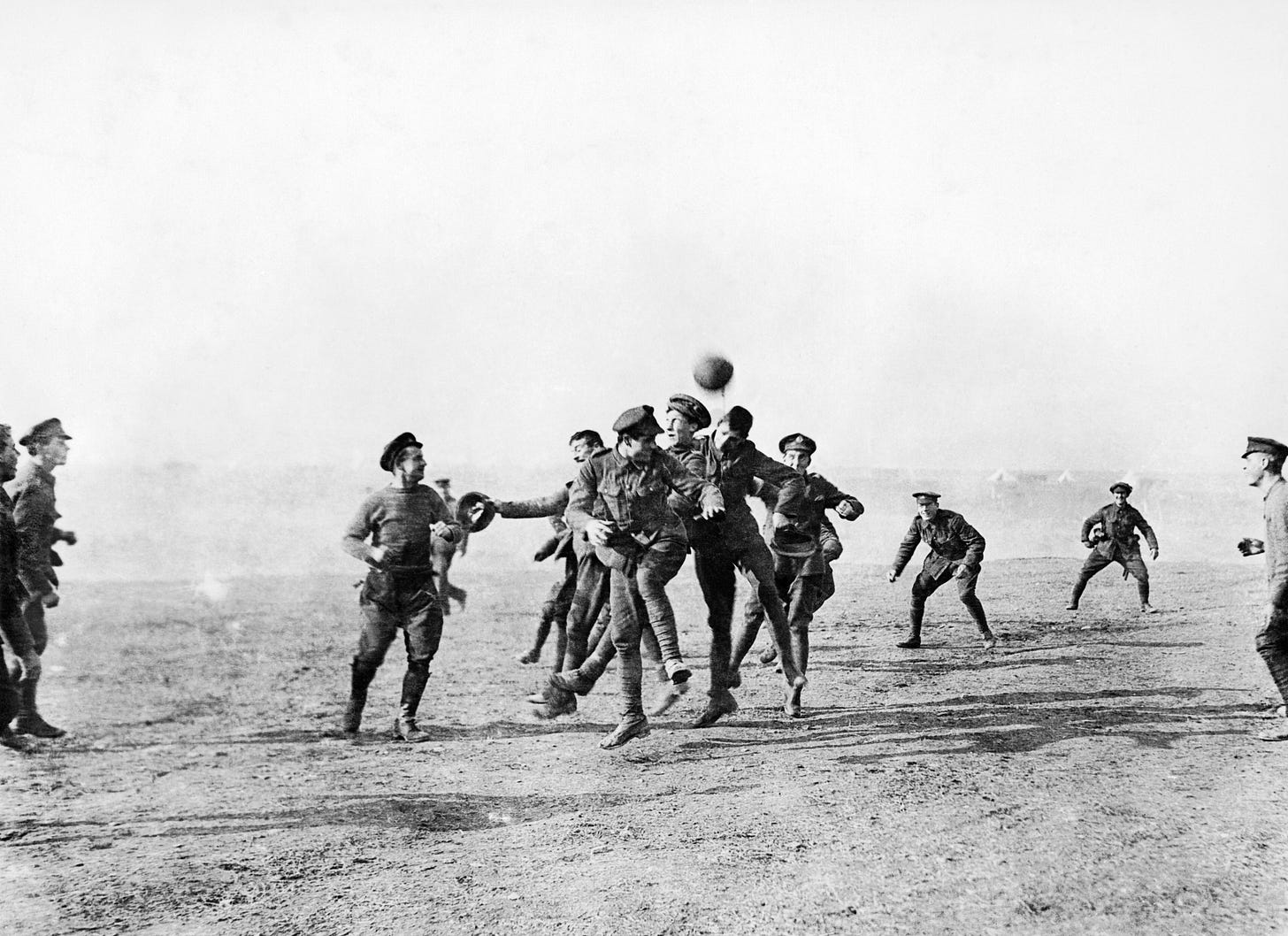December 25th, 1914 》The Christmas Truce
A Moment of Peace Amidst the Chaos of War
December 25th dawns, a day draped in tinsel and tales of Santa Claus.
Yet, as I sip my afternoon coffee, the steam curling like phantoms into the cool air, my thoughts drift to a Christmas past, a story less told but profoundly significant.
The year was 1914, the world gripped in the throes of the First World War. But on this day, an extraordinary event unfolded, one that would etch itself into the fabric of history: the Christmas Truce.
It began almost like a fable. British and German soldiers, entrenched in the mud and misery of the Western Front, lay down their weapons.

A moment of peace, fragile as a snowflake yet as profound as the silence that enveloped the battlefield. I can't help but wonder, what stirred in the hearts of those soldiers?
Was it a yearning for normalcy, a desperate grasp for humanity in a world gone mad?
The scene unfolds in my mind – a frosty morning, the sun a mere suggestion behind a veil of gray.
Someone must have been the first, a lonely voice cried out amidst the pause of gunfire. The slowly, one by one, others joined in—a choir on the battlefield emerged.
Voices, hesitant at first, then growing bolder, caroling through the crisp air, a chorus of 'Stille Nacht, Heilige Nacht' mingling with 'Silent Night, Holy Night'. A melody, transcending language barriers, weaving a transient bond across trenches and between foes.
Men, cautious yet curious, emerged from their fox holes. Hands that had hurled grenades now extended in fellowship, offering gifts of cigarettes, plum puddings, and photographs of loved ones.
For a day, the battlefield transformed into a surreal playground where soldiers played football, shared stories, and saw each other not as enemies, but as humans, equally trapped in the gears of a war machine.
This spontaneous ceasefire, a beacon of humanity's intrinsic desire for connection, permeates with a hidden truth. It echoes the absurdity of conflict, the dichotomy of war and peace, and the innate human longing for understanding and compassion.
In those short hours, the soldiers embraced EchoSpectivism, seeing beyond the black and white narrative of friend and foe, recognizing the complex hues of human emotion and experience. For a moment, their voices echoed in harmony over harm, peace over power.
But sure as it may, as night fell, the reality of war crept back, a looming specter over the ephemeral peace.
The soldiers returned to their trenches, the echo of laughter replaced by the staccato of gunfire, the warmth of shared humanity giving way to the cold grasp of duty and survival.
Now, as I sit here, over a century later, the story of the Christmas Truce serves as a powerful reminder of the resilience of the human spirit.
In the 21st century, we are challenged to look beyond the constructed divides of the powerful, to recognize the shared humanity that binds us, even in the darkest of times. It's a testament to the power of hope, the ability to find light in the bleakest of winters.
This Christmas, as many unwrap presents and gather around festive tables, let's remember the men who, on this day, dared to dream of peace in a world at war.
Their story is a call to action, a reminder that amidst the chaos of our own battles, be they personal or global, there exists the potential for understanding, for moments of unscripted peace and unity.
The legacy of the Christmas Truce extends beyond the history books; it's an echo of the past that challenges us to question, to empathize, and to strive for those brief moments of connection and peace.
It's a story that combines with EchoSpectivism, urging us to embrace the complexities of life, to find harmony amidst contradiction, and to recognize the absurd, yet beautiful complexity of human existence.
As mid-day ends, I put down my pen and look up, my eyes adjust into the Christmas lights.
The story of the Christmas Truce, like the melody of 'Silent Night', lingers in the air, a haunting reminder of what could be, a whisper of hope in a world too often divided.
Let us carry this message, not just today, but into every tomorrow – the enduring spirit of Christmas, a call for peace, understanding, and the unwavering belief in the goodness that resides in each of us.
If enemies on the battlefield in 1914 can put down their weapons and trade stories instead of gunfire, then why can't we in 2023?


